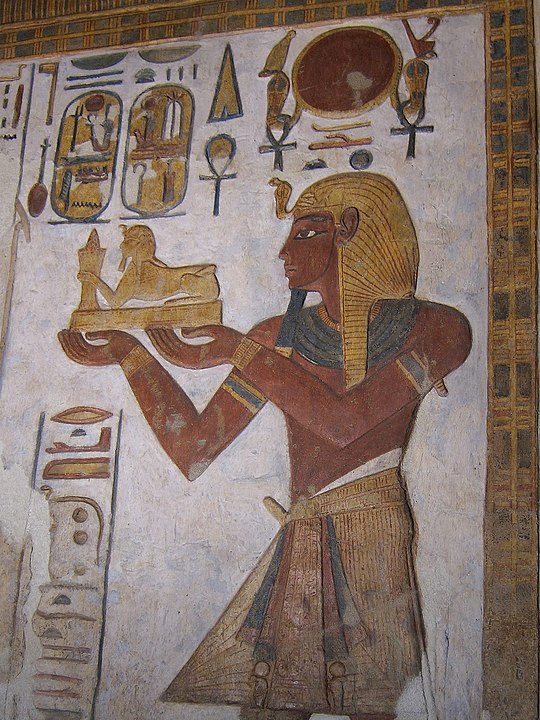
When did the Egyptian Empire start to decline? It peaked during the reigns of Ramesses II and Ramesses III from 1279 BC to 1155 BC) and then began to decline.
People have been living along the Nile valley since about twelve thousand years ago. They were hunter gatherers and fishermen to start with, but they started to farm grain. In about 6000 BC, the climate changed, and the Sahara began to grow, pushing the farmers to the Nile River where the land was still fertile. Societies began to develop and the main one was the Badarian culture. They were replaced by the Naqada culture that lasted for about a thousand years.
The cultures living along the Nile spread out and by 3100 BC, they had formed Upper and Lower Egypt. Lower Egypt was, counterintuitively, the northern part, around the Nile delta. Upper Egypt was the section below that, around where the Naqada people had lived. The Upper and Lower names do make sense if you think that the Naqada people that controlled “Upper” were the main group of people. It also makes sense if you think that the river flows “down” towards the sea and the delta. In roughly 3100 BC, King Menes, a Naqada pharaoh, was able to unite both of the two kingdoms. This started the Old Kingdom period of Egyptian history.
Egyptian culture took off from this point and the idea of ruling dynasties began. The first use of proper hieroglyphics have been found from this time. This new kingdom grew and the period that is known as the Old Kingdom started. This period is famous for the building of the pyramids at Giza, a sign that infrastructure and the economy were flourishing.
The economy stopped flourishing in 2130 BC and the Old Kingdom fell. This has been linked to droughts but there are many other reasons. There were about one hundred years of political and social unrest, civil war, invasions, famine, and disease before the pharaohs took back control and the Middle Kingdom started. During the Middle Kingdom, the empire expanded slightly, and Egypt managed to take control of Nubia, which brought in a steady supply of gold. As with the Old Kingdom, the Middle Kingdom also declined and fell in 1786 BC. There was another period of upheaval and civil wars for about two hundred years. The throne of Egypt was taken by a foreign invading people called the Hyksos. It would be a long time before Egyptians could take the throne back.
In 1567 BC, Ahmose I was able to finally defeat the Hyksos and the throne of Egypt was Egyptian again. This would begin the New Kingdom, which was the peak of the Egyptian Empire. The Egyptians were able to expand trade routes and managed to conquer the area that is now Syria. The idea was to create buffer states that would protect Egypt from invasions by people like the Hyksos.
The pharaohs that followed Ahmose continued to expand the empire. Nubia was retaken, bringing in much needed gold. They stabilized the economy and Egypt became one of the wealthiest empires in the world. Many new buildings were built, and many old temples were restored. Then, in 1279 BC, Ramesses II, the first of the last three powerful pharaohs of Egypt. He was able to expand the empire to the north and the west. He built hundreds of monuments to himself and is probably one of the most well-known pharaohs. He was succeeded by Merenptah in 1213 BC. He was able to defeat various invasions by the Sea People and continued Ramesses II’s campaigns. Then, in 1186, the last great pharaoh, Ramesses III, took the throne. The Sea People invaded again, and Ramesses III was able to fight them back, but at tremendous cost. Egypt was losing money and international power. Ramesses III was a strong leader, and he was able to hold the kingdom together, but this was the peak of Egyptian power, and his death would signal the start of the decline.
So, when did the Egyptian Empire start to decline? On the death of Ramesses III in 1155 BC, there was no one left who could hold the kingdom together and the Egyptian Empire began to decline. Egypt wasn’t wealthy anymore and this caused international relations to suffer. There were famines and droughts. The Sea People invasions had killed so many people that there weren’t enough workers for the fields and grain production plummeted. Tomb-robbing increased because of the lack of money. Corruption became rife and the provinces of Palestine and Syria were lost. By 1069 BC, civil unrest and the collapsing economy caused the kingdom to break up into a collection of city-states. The Egyptian Empire was no longer.
Over the next 400 years, Egypt would go through a lot of civil unrest and different groups of people, often not Egyptian, would seize power. In the 8th century BC, the Nubians took power. In the 6th century BC, the Persians conquered Egypt. Egyptians managed to retake control of the country in the 4th century BC, before the Persians retook power. The Greeks conquered Egypt in 305 BC and the Romans in 30 BC. Egypt would never be ruled by Egyptian Pharaohs again.
So, when did the Egyptian Empire start to decline? It peaked during the reigns of Ramesses II and started to decline after Ramesses III. And this is what I learned today.
Sources
https://www.worldhistory.org/Egyptian_Empire/
https://www.history.com/topics/ancient-history/ancient-egypt
https://www.penfield.edu/webpages/jgiotto/resources.cfm?subpage=1617942
https://www.journeytoegypt.com/en/blog/egypt-map
https://www.studentsofhistory.com/the-decline-of-egypt
https://en.wikipedia.org/wiki/Naqada_III
https://en.wikipedia.org/wiki/Menes
https://en.wikipedia.org/wiki/Upper_and_Lower_Egypt
https://en.wikipedia.org/wiki/Old_Kingdom_of_Egypt

[…] were forced to move to the Nile river. One of them, the Nubian culture, would go on to be the Egyptians. The grassland became desert in the space of about 200 years, drastically altering the way that […]